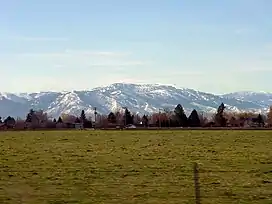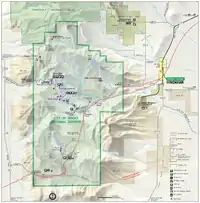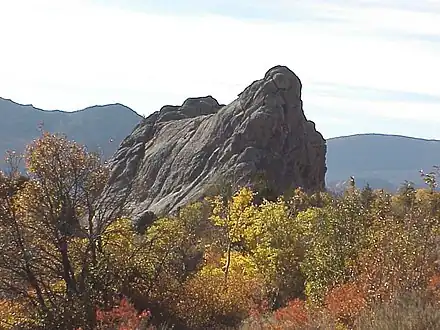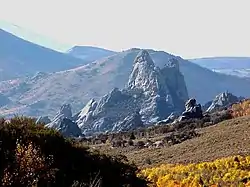| Albion Mountains | |
|---|---|
 Albion Mountains from Heyburn | |
| Highest point | |
| Peak | Cache Peak |
| Elevation | 10,339 ft (3,151 m) |
| Coordinates | 42°11′08″N 113°39′40″W / 42.185606°N 113.661156°W |
| Dimensions | |
| Length | 49 mi (79 km) N/S |
| Width | 36 mi (58 km) E/W |
| Area | 1,082 sq mi (2,800 km2) |
| Geography | |
| Country | United States |
| State | Idaho |
The Albion Mountains are a mountain range in the U.S. states of Idaho (~99%) and Utah (~1%), spanning Cassia County, Idaho and barely reaching into Box Elder County, Utah.[1] The highest point in the range is Cache Peak at 10,339 feet (3,151 m), and the range is a part of the Basin and Range Province.[2][3][4] Most of the mountains are part of the Albion Division of the Minidoka Ranger District of Sawtooth National Forest.[5]
The Raft River Mountains are southeast of the range, while the Black Pine Mountains are to the east and the Snake River Plain to the north. The streams in the mountains are in the Snake River watershed, which is a tributary of the Columbia River. The towns of Almo, Elba, and Malta are east of the range, Albion, Burley, and Heyburn are to the north, and Oakley is to the west. There are six alpine lakes in the Albion Mountains. Lake Cleveland is north of Mount Harrison, a small unnamed lake is southeast of Mount Harrison, and the four Independence Lakes are north of Cache Peak.[5]
Several roads and trails are located in the mountains, which provide for a variety of activities including hiking, off-road vehicle riding, fishing, and hunting.[6] A paved road ascends to the summit of Mount Harrison. Most of the peaks can be accessed relatively easily via class one or two routes. City of Rocks National Reserve and Castle Rocks State Park are located in the southern portion of the range and is a popular destination for rock climbing.[7] The Pomerelle ski area is located in the range and has two chairlifts.[8]
Idaho's rarest plant, Christ's Indian Paintbrush is a plant endemic to the upper slopes of Mount Harrison, being found nowhere else in the world.[9] Davis' springparsley is a plant that is also endemic to the Albion Mountains.[10][11] The South Hills crossbill is a bird believed to be a separate species than the Common crossbill, and it is endemic to the Albion Mountains and the South Hills due to ecological speciation.[12]
In February 1945 nine people died on Mount Harrison when a B-24 Liberator Army Bomber crashed during a training mission in dense fog.[13][14]
Peaks
Gallery
 Map of City of Rocks and the southern Albion Range
Map of City of Rocks and the southern Albion Range Bath Rock in the City of Rocks
Bath Rock in the City of Rocks City of Rocks
City of Rocks City of Rocks
City of Rocks
See also
References
- ↑ "Albion Mountains". Geographic Names Information System. United States Geological Survey, United States Department of the Interior.
- ↑ "Cache Peak". Geographic Names Information System. United States Geological Survey, United States Department of the Interior.
- ↑ "Albion Range". PeakBagger. Retrieved 2012-05-10.
- ↑ "Cache Peak, Idaho". PeakBagger. Retrieved 2012-05-10.
- 1 2 3 Sawtooth National Forest (Map) (1998 ed.). Sawtooth National Forest, U.S. Forest Service.
- 1 2 "Albion Range". Summitpost. Retrieved 2012-05-10.
- ↑ "City of Rocks National Preserve". NPS.gov. Retrieved 2012-05-10.
- ↑ "Pomerelle Mountain Resort". Pomerelle Mountain Resort. Retrieved 2012-05-10.
- ↑ Castilleja christii. Archived 2011-10-26 at the Wayback Machine Center for Plant Conservation. Retrieved 10-23-2011.
- ↑ Hartman, Ronald L. (January–March 1985). "A new species of Cymopterus (Umbelliferae) from southern Idaho". Brittonia. New York Botanical Garden. 37 (1): 102–105. doi:10.2307/2806254. ISSN 0007-196X. JSTOR 2806254. S2CID 84433973.
- ↑ Moseley, Robert K. (October 1993), The status and distribution of Christ's Indian paintbrush (Castilleja christii) and Davis' wavewing (Cymopterus davisii) in the Albion Mountains, Sawtooth National Forest and City of Rocks National Reserve (PDF), Idaho Department of Fish and Game, archived from the original (PDF) on 3 December 2013, retrieved 22 May 2012
- ↑ Smith J.W.; Benkman C.W. (2007). "A coevolutionary arms race causes ecological speciation in crossbills". American Naturalist. 169 (4): 455–65. doi:10.1086/511961. PMID 17273981. S2CID 23415653.
{{cite journal}}: CS1 maint: multiple names: authors list (link) - ↑ "The Plane Crash of 1945". Untraveled Road. Retrieved 2012-05-10.
- ↑ "Mount Harrison, ID Bomber Crashes, Feb 1945". GenDisasters. Archived from the original on 2014-08-08. Retrieved 2012-05-10.
- ↑ "ID Peaks List Cassia County". List of John. Retrieved January 1, 2013.
- ↑ "Geographic Names Information System". USGS. Retrieved January 1, 2013.
External links
- U.S. Forest Service Sawtooth National Forest